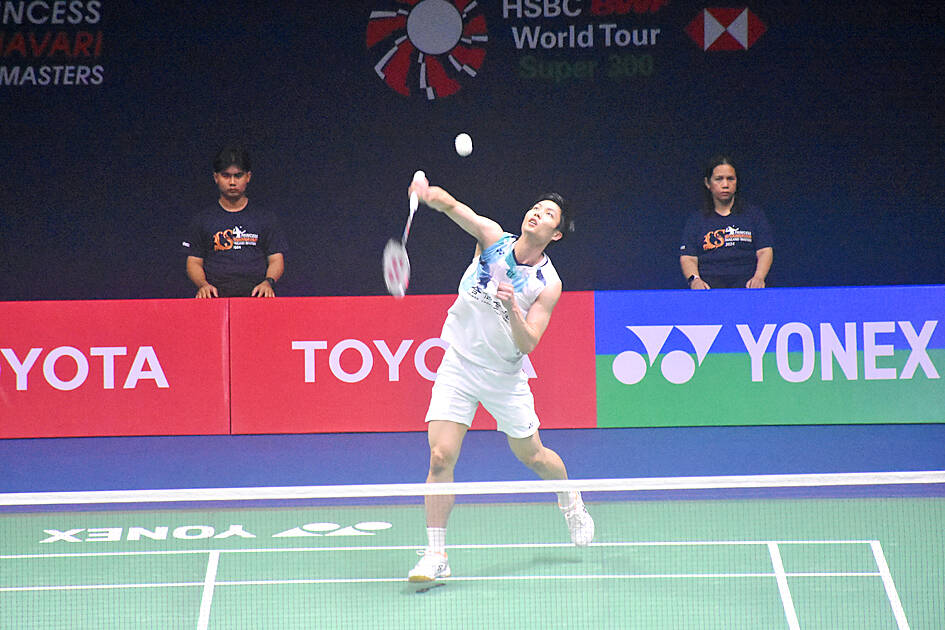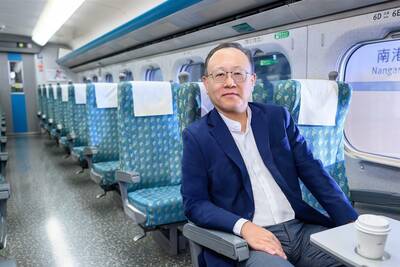Taiwanese badminton ace Chou Tien-chen (周天成) had a poor year by his standards in 2023, so his joyous celebration after winning the men’s singles title at the Thailand Masters on Sunday, an event a top-tier player like him would not usually enter, was anything but a surprise.
After closing out his 62-minute, 21-16, 6-21, 21-16 title win against Singapore’s Loh Kean Yew (駱建佑) with a smash, Chou lay on the court panting. He covered his face with his hand and let out a yell that was nearly drowned out by cheering fans.
“He’s indeed savoring the moment,” ELTA TV commentator Tsai Hui-min (蔡慧敏) said. “It was so challenging to win the match after having to manage his stamina and change his tactics the way he did today.”

Photo: CNA
A quick shot of Chou’s physiotherapist, Kao Min-shan (高敏珊), praying at courtside after the win suggested that something more was going on.
In a post-match media interview, the 34-year-old Chou revealed that the real reason the victory in a Super 300 tour event meant so much was because he had been diagnosed with early-stage colorectal cancer last year.
The aftermath of the ordeal made it a challenge to continue competing at the highest level for the former world No. 2 player, he said.
During a break at the beginning of last year, Chou said he realized he had not had a physical for two or three years, so he decided to have one done.
He was diagnosed with cancer after undergoing a colonoscopy, and soon after had an operation to remove part of his colon, he said.
“Actually, the other doctor I saw then thought the cancer was not bad and told me to have a follow-up appointment a year later, but that did not make sense to me, so I decided to do the operation,” Chou said.
To prevent the cancer from spreading, the doctor removed more of Chou’s large intestine than usual, which required using a clip that can be absorbed by the body to help the wound heal.
“Perhaps it was because I did enough good deeds so I could witness the Lord’s glory, or perhaps what I did was not enough so God let me find it out earlier so as to live a bit longer and do more,” Chou, a Christian, said jokingly.
He was baptized in 2012 at Kao’s suggestion after undergoing a slump, the online news site Christian Daily reported.
The day after his operation, he boarded a plane to continue competing overseas.
Although the ordeal did not have much of an effect on his training, his diet had to be controlled, and it took time to recover from the shock of learning he had cancer.
After all, Chou had maintained a strict training regimen, maintained a disciplined daily routine and ate a healthy diet, so he said he never thought he would get cancer.
Unsurprisingly, last year was a slump for him. In the 28 tournaments he played, he only made it to the semi-finals or better three times, and never made it further than the round of 16 in others.
It was not until another lower-tier Super 300 tour event, the Hylo Open in Saarbrucken, Germany, in early November last year, that he won his only title of the year.
That dip in form saw Chou’s world ranking plunge from No. 5 to No. 14 during the course of the year.
“I think there are limited things we can do. I kept telling myself that I had made it through this way before when I had not won a title, and I have made it through the cancer operation, so there is no way I cannot make it through the skid this time,” he said.
After winning the Hylo Open, Chou talked about his mental journey against cancer in public for the first time at a church activity the same month.
He said it is time to let more people know about it.
“I realize that nothing I have now should be taken for granted, nor should I feel smug, because everything is earned through perseverance,” Chou said. “I hope I can encourage myself and inspire others, by letting them know they are definitely able to find a way out no matter what setback or accident they are confronted with.”
Chou returned to Taiwan for the Lunar New Year break. He next plans to head to Europe on Feb. 27 to play in five tournaments there.

The inspection equipment and data transmission system for new robotic dogs that Taipei is planning to use for sidewalk patrols were developed by a Taiwanese company, the city’s New Construction Office said today, dismissing concerns that the China-made robots could pose a security risk. The city is bringing in smart robotic dogs to help with sidewalk inspections, Taipei Deputy Mayor Lee Ssu-chuan (李四川) said on Facebook. Equipped with a panoramic surveillance system, the robots would be able to automatically flag problems and easily navigate narrow sidewalks, making inspections faster and more accurate, Lee said. By collecting more accurate data, they would help Taipei

STATS: Taiwan’s average life expectancy of 80.77 years was lower than that of Japan, Singapore and South Korea, but higher than in China, Malaysia and Indonesia Taiwan’s average life expectancy last year increased to 80.77 years, but was still not back to its pre-COVID-19 pandemic peak of 81.32 years in 2020, the Ministry of the Interior said yesterday. The average life expectancy last year increased the 0.54 years from 2023, the ministry said in a statement. For men and women, the average life expectancy last year was 77.42 years and 84.30 years respectively, up 0.48 years and 0.56 years from the previous year. Taiwan’s average life expectancy peaked at 81.32 years in 2020, as the nation was relatively unaffected by the pandemic that year. The metric

TAKING STOCK: The USMC is rebuilding a once-abandoned airfield in Palau to support large-scale ground operations as China’s missile range grows, Naval News reported The US Marine Corps (USMC) is considering new sites for stockpiling equipment in the West Pacific to harden military supply chains and enhance mobility across the Indo-Pacific region, US-based Naval News reported on Saturday. The proposed sites in Palau — one of Taiwan’s diplomatic allies — and Australia would enable a “rapid standup of stored equipment within a year” of the program’s approval, the report said, citing documents published by the USMC last month. In Palau, the service is rebuilding a formerly abandoned World War II-era airfield and establishing ancillary structures to support large-scale ground operations “as China’s missile range and magazine

Passengers on Taiwan High Speed Rail (THSR) will be required to use headphones and make phone calls in gangways under new “quiet travel” rules starting Sept. 22. THSR Chairman Shih Che (史哲) told media that THSR will run a three-month promotional campaign to ensure widespread adoption of the new rules. Those repeatedly ignoring the guidance face the potential termination of their transport contract, which can result in them getting escorted off the train, according to THSR. Shih shared his hope to cultivate an environment conducive to rest and reading for the train’s passengers, stating that these changes aim to “promote self-discipline” among passengers